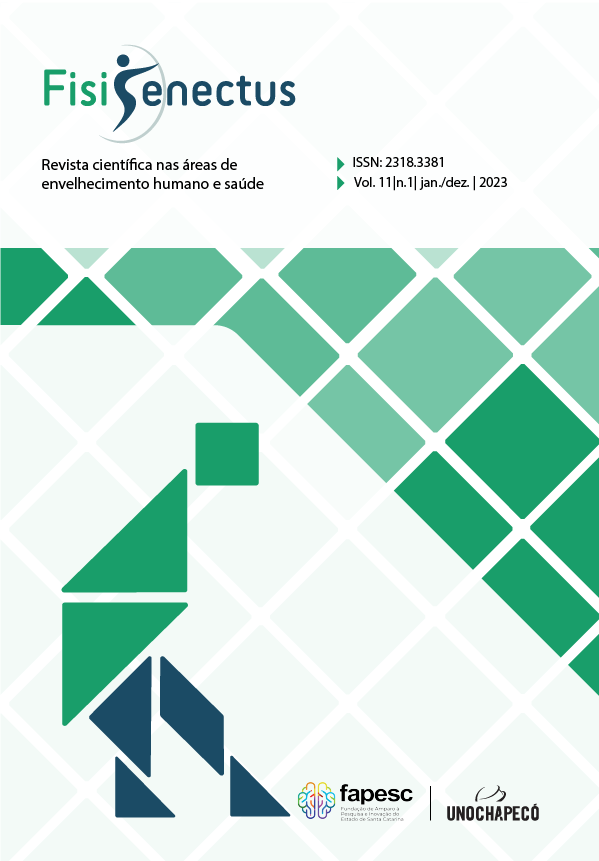Riesgo de caídas, movilidad funcional y cinesiofobia en personas mayores con vértigo
Risk of falling, functional mobility and kinesiophobia in elderly people with vertigo
DOI:
https://doi.org/10.22298/rfs.2023.v11.n1.7830Palabras clave:
Personas mayores, Kinesiofobia, VértigoResumen
Introducción: El proceso de envejecimiento es un proceso dinámico, progresivo e individual, que puede provocar cambios en el funcionamiento de los sentidos del cuerpo, provocando limitaciones en el control postural y vértigo. Las personas mayores con vértigo tienen un alto riesgo de sufrir caídas, lo que puede estar asociado con un comportamiento kinesiofóbico. Objetivo: Evaluar el riesgo de caídas, movilidad funcional y kinesiofobia en personas mayores con vértigo. Metodología: Se evaluaron nueve ancianos con diagnóstico de vértigo, un hombre y ocho mujeres, con edad promedio de 74,7 (±3,91) años. La kinesiofobia se evaluó mediante la Escala de Kinesiofobia de Tampa (TSK). El riesgo de caídas y la movilidad se evaluaron mediante el Timed Up and Go Test (TUGT) y el TUG con tarea cognitiva (TUGcog). Los datos fueron analizados utilizando el software estadístico R versión 4.2.1. Resultados: El promedio de puntos en el TSK fue de 35,3 puntos, indicando la presencia de kinesiofobia en cuatro ancianos (44,4%) y dos de ellos fueron clasificados con riesgo de caída según el tiempo de ejecución en el TUGcog. El tiempo promedio para realizar el TUGT fue de 7,12 (±0,98) segundos y el tiempo promedio para realizar el TUGcog fue de 9,08 (±1,42) segundos. La diferencia entre los tiempos para la realización de las dos pruebas fue estadísticamente significativa (p=0,003). No se encontró correlación entre los tiempos de realización de las pruebas TUGT y el TSK. Conclusión: Las personas mayores con vértigo no tienen riesgo de caerse usando TUGT y TUGcog y realizaron TUGcog significativamente más tiempo que TUGT. Además, cuatro personas mayores presentaron kinesiofobia independiente del riesgo de caída.
Descriptores: Aged. Kinesiofobia. Vértigo.
Descargas
Descargas
Publicado
Cómo citar
Número
Sección
Licencia
Derechos de autor 2023 Tamiris Beppler Martins, Taís Beppler Martins, Yuri Sartorato Pauli Bianchi, Tais Costella, Maria Elisa Duarte França, Gilmar Moraes Santos

Esta obra está bajo una licencia internacional Creative Commons Atribución-NoComercial-SinDerivadas 4.0.
Aviso de Direito Autoral Creative Commons
Política para Periódicos de Acesso Livre
Autores que publicam na Revista FisiSenectus oncordam com os seguintes termos:
- Autores têm autorização para assumir contratos adicionais separadamente, para distribuição não-exclusiva da versão do trabalho publicada nesta revista (ex.: publicar em repositório institucional ou como capítulo de livro), com reconhecimento de autoria e publicação inicial nesta revista, exceto para publicação do artigo em outra revista/periódico científico.
- Autores têm permissão e são estimulados a publicar e distribuir seu trabalho online (ex.: em repositórios institucionais ou na sua página pessoal) a qualquer ponto antes ou durante o processo editorial, já que isso pode gerar alterações produtivas, bem como aumentar o impacto e a citação do trabalho publicado (Veja O Efeito do Acesso Livre).













